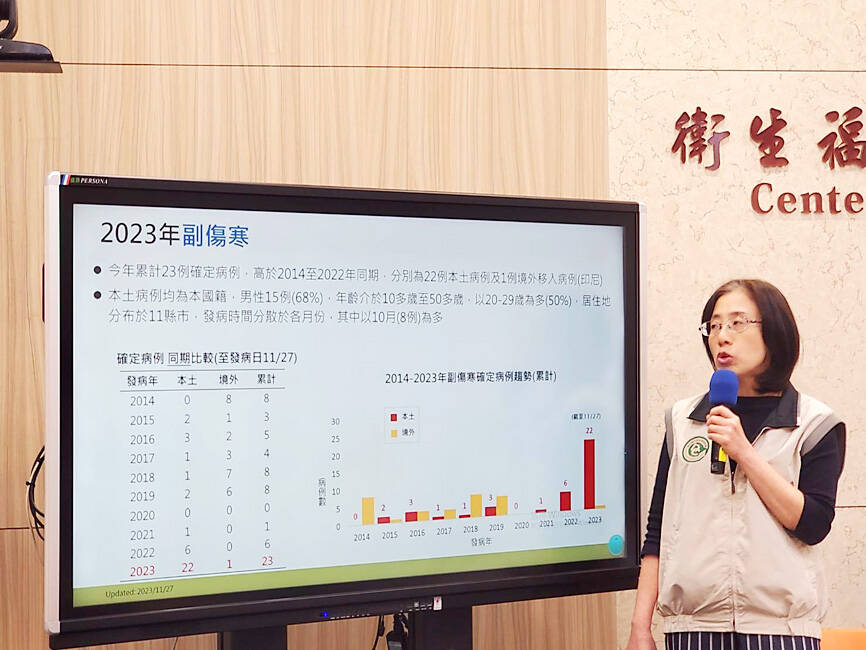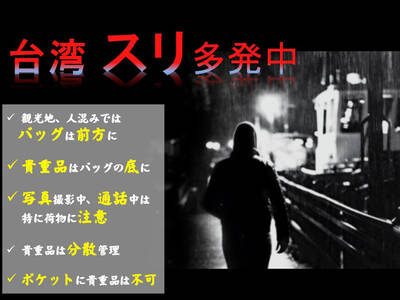Twenty-two local cases of paratyphoid fever have been reported so far this year — the highest number for the period since 2014, the Centers for Disease Control (CDC) said yesterday.
One imported case from Indonesia was also reported this year, CDC Epidemic Intelligence Center Deputy Director Lee Chia-lin (李佳琳) said.
The patients were between the ages of 10 and 60, and half of them were in their 20s, she said, adding that cases were reported in 11 cities and counties.

Photo: Lin Hui-chin, Taipei Times
CDC Deputy Director-General Philip Lo (羅一鈞) said some of the cases seem to be linked to the consumption of undercooked seafood, as five of the 22 had eaten grilled oyster and two had eaten raw oyster.
Eight people began experiencing symptoms in October, he said.
The cases did not involve cluster infections among family members, at schools or workplaces, so human-to-human transmission has not been detected, Lo said.
However, the centers would continue to conduct contact tracing and whole genome sequencing on bacteria specimens to clarify the likely sources of infection, he said.
The bacteria that cause paratyphoid fever are usually spread through food or water that has been contaminated with the feces or urine of an infected person, but people can also get infected by eating undercooked seafood, especially shellfish, from a contaminated water source, CDC physician Lin Yung-ching (林詠青) said.
The incubation period is usually one to 10 days, the infectious period is about one to two weeks, and common symptoms include a continuous fever, headaches, malaise, weight loss, diarrhea, a slow heart rate and sometimes a red rash on the torso, he said.
The seriousness of paratyphoid fever can vary depending on the bacterial strain, viral load and the length of time before treatment, but in some cases severe intestinal complications have led to death, Lin said, adding that with prompt diagnosis and proper treatment, the mortality rate falls to less than 1 percent.
To reduce the risk of catching paratyphoid fever, people should avoid eating raw or undercooked food and drinking water that is from an unknown source or has not been boiled, avoid cross-contamination when preparing raw and cooked food, and maintain good personal hygiene, especially by washing hands thoroughly before and after preparing food, before eating and after using the toilet, he said.
Of the 22 local cases, one man in his 50s has died, but he was hospitalized for cancer treatment when he began experiencing diarrhea and tested positive for the bacteria, Lo said.
The man did not eat raw food in the hospital and his accompanying family members tested negative for paratyphoid, so the infection source remains unknown, he said.
Meanwhile, the CDC said 243 cases of invasive pneumococcal disease have been reported so far this year — the highest number for the period in three years.
Forty-four percent of the cases involved people aged 65 or older, it said.
Eligibility for a government-funded pneumococcal vaccination program was expanded on Monday, so people aged 65 or older can get a dose of the 13-valent pneumococcal conjugate vaccine if they have never received one before, Lo said.
Three types of government-funded vaccines are recommended for elderly people, including the XBB.1.5-adapted COVID-19 vaccine, the flu vaccine and the pneumococcal vaccine, he said, adding that they can reduce the risk of severe complications after infection.

GENSLER SURVEY: ‘Economic infrastructure is not enough. A city needs to inspire pride, offer moments of joy and foster a sense of belonging,’ the company said Taipei was named the city with the “highest staying power” in the world by US-based design and architecture firm Gensler. The Taiwanese capital earned the top spot among 65 cities across six continents with 64 percent of Taipei respondents in a survey of 33,000 people saying they wanted to stay in the city. Rounding out the top five were Vietnam’s Ho Chi Minh City (61 percent), Singapore (59 percent), Sydney (58 percent) and Berlin (51 percent). Sixth to 10th place went to Monterrey, Mexico; Munich, Germany; Sao Paulo, Brazil; Vancouver; and Seoul. Cities in the US were ranked separately, with Minneapolis first at

The Japan-Taiwan Exchange Association has cautioned Japanese travelers to be vigilant against pickpockets at several popular tourist spots in Taiwan, including Taipei’s night markets, the Yongkang Street area, Zhongshan MRT Station, and Jiufen (九份) in New Taipei City. The advisory, titled “Recent Development of Concerns,” was posted on the association’s Web site under its safety and emergency report section. It urges travelers to keep backpacks fully zipped and carried in front, with valuables placed at the bottom of the bag. Visitors are advised to be especially mindful of their belongings when taking photos or speaking on the phone, avoid storing wallets and

Scoot announced yesterday that starting in October, it would increase flights between Taipei and Japan’s Narita airport and Hokkaido, and between Singapore and Taipei. The low-cost airline, a subsidiary of Singapore Airlines, also said it would launch flights to Chiang Rai in Thailand, Okinawa and Tokyo’s Haneda airport between December and March next year. Flights between Singapore and Chiang Rai would begin on Jan. 1, with five flights per week operated by an Embraer E190-E2 aircraft, Scoot said. Flights between Singapore and Okinawa would begin on Dec. 15, with three flights per week operated by Airbus A320 aircraft, the airline said. Services between Singapore

ENDORSING TAIWAN: Honduran presidential candidate Nasry Afura said that Honduras was ‘100 times better off’ when it was allied with Taipei The Ministry of Foreign Affairs yesterday said it would explore the possibility of restoring diplomatic relations with Honduras based on the principle of maintaining national interests and dignity. The ministry made the remarks in response to reporters’ questions regarding an article titled: “Will Taiwan Regain a Diplomatic Ally?” published in The Diplomat on Saturday. The article said Honduras’ presidential election in November could offer Taiwan the chance to regain an ally, as multiple candidates have promoted re-establishing diplomatic relations with Taiwan. Honduras severed diplomatic ties with Taiwan in March 2023 in favor of Beijing, but since switching its diplomatic recognition,